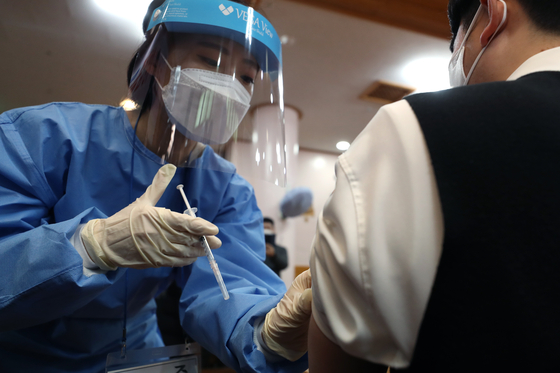
On the morning of the 23rd, a mock training for vaccination against the new coronavirus infection (Corona 19) was held at the auditorium in Sohnuri, Nam-gu, Gwangju for nursing home workers and residents, and medical staff are practicing rehearsal. yunhap news
Vaccination for a new coronavirus infection (Corona 19) in Korea is approaching three days in the future. On the 26th, the vaccination begins with the AstraZeneca vaccine. This target is for residents and workers in nursing hospitals and nursing facilities nationwide. On the 27th, the very next day, Pfizer vaccination will be given to the medical staff of the Corona 19 treatment hospital. Prior to full-scale vaccination, we summarized precautions for vaccination through the’Corona 19 Vaccination Guidelines’ released by the Central Defense Response Headquarters.
① How did the’AZ 8 weeks’ interval come out?
Both AstraZeneca and Pfizer vaccines, which are introduced first in Korea, should be vaccinated twice. The quarantine authorities plan to administer AstraZeneca vaccination every 8 weeks and Pfizer every 3 weeks. Earlier, in the case of AstraZeneca, it was approved for urgent use in the UK under the condition of inoculating every 4 to 12 weeks. In accordance with the World Health Organization (WHO) recommendation that the longer the vaccination interval, the higher the immunity formation rate, the domestic Corona 19 vaccination response team has set the vaccination interval to 8 weeks. In the case of Pfizer vaccine, the second dose is given three weeks after the first dose.
② If vaccination was earlier than recommended
In general, re-vaccination is not recommended if the second vaccination is done earlier than the baseline. However, if a patient who received the AstraZeneca vaccine received a second dose earlier than the minimum inoculation interval of 21 days, re-vaccination should be performed at least 28 days after the incorrect vaccination date. In the case of Pfizer vaccine, re-vaccination is not recommended. On the other hand, if the second vaccination is later than recommended, the second vaccination is administered as soon as possible at the time of recognition, without starting again from the first.

Military authorities and officials from related organizations are conducting a simulation training for the safety distribution of a novel coronavirus infectious disease (Corona 19) vaccine that was introduced by a military transport plane at Jeju International Airport on the afternoon of the 19th.
③ Is it possible to cross-/additional vaccination with other vaccines?
It is a position that it is not recommended because there are no safety and efficacy data for cross-over, addition, and simultaneous vaccinations with other types of Corona 19 vaccines.
④ In the case of a confirmed person or a person with symptoms
If it is classified as a corona19 confirmed person or contact and is in quarantine, vaccination is possible after quarantine is released. Also, if the symptoms of Corona 19 persist for a long time or are in a debilitating state, you should consider delaying vaccination. On the other hand, those infected with Corona 19 and then cured can be vaccinated. However, it is recommended that vaccinations be performed after at least 90 days for subjects who receive monoclonal antibodies or blood system therapy after confirmation.
⑤ Those who are contraindicated or excluded from vaccination
If you have a history of anaphylaxis (severe allergic reaction) after previous COVID-19 vaccine vaccination, or if you have a history of anaphylaxis related to the components of the COVID-19 vaccine, you should not be vaccinated. Pregnant women and children under the age of 18 were also excluded from vaccination because no clinical results were available for safety or efficacy.

On the afternoon of the 19th, staff at the Buk-gu Health Center in Gwangju are handed over a model vaccine and inspected it. News 1
⑥ When vaccination needs to be postponed
In case of suspected COVID-19 infection or acute illnesses such as fever (37.5 degrees or higher), including those who are in quarantine or those who are in quarantine, the vaccination can be postponed until symptoms disappear.
⑦ Can a chronically ill, weakened immunity, and nursing women be beaten?
There are no specific data on safety and efficacy in the case of immunocompromised or lactating women. However, the Korean Vaccination Committee recommends that people who are eligible for vaccination get the vaccine. It is recommended that people with chronic diseases should get a vaccine because it has been found to have similar effects to those without an underlying disease.
Reporter Woorim Lee [email protected]
